Leaders in advancing and studying transitional justice as a response to mass atrocities and systemic corruption around the globe gathered for a daylong symposium sponsored by Drexel Law Review on Oct. 12.
“Times of Reckoning: Confronting the Legacies of Mass Abuse through Transitional Justice” explored the diverse contexts in which transitional justice occurs, the array of mechanisms employed and the growing role that foreign courts play in judging alleged crimes committed in other countries. The event was co-sponsored by UN Women and the American Society of International Law.
Justice Richard Goldstone, who played a key role in transitioning South Africa from apartheid to democracy, tallied the millions of civilian casualties produced by global conflicts in countries including Rwanda, where hundreds of thousands of killers engaged in genocide.
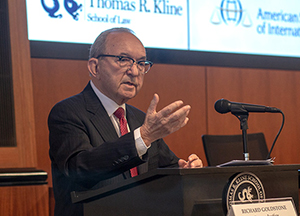 “What system can put that number of people on trial,” Goldstone asked, contending that conventional tribunals can merely hold up leaders “as tokens of what was done by people under their command and control.”
“What system can put that number of people on trial,” Goldstone asked, contending that conventional tribunals can merely hold up leaders “as tokens of what was done by people under their command and control.”
Transitional justice requires compromise on the part of victims who may have to settle for simple acknowledgement, and political will on the part of successor regimes, Goldstone said, citing numerous instances where transitional justice efforts failed. For instance, a Truth and Reconciliation Commission that was convened in response to violence surrounding the 2007 national elections in Kenya was overshadowed by the International Criminal Court, which in turn halted its prosecution after witnesses were killed.
“Here the court and commission both failed,” Goldstone said, noting that South Africa’s more successful reconciliation process reflected a willingness on the part of President Nelson Mandela to commission an inquiry that led the African National Congress to acknowledge its own wrongs and, independently, the charismatic persona of Archbishop Desmond Tutu, who provided a public face for the process that was acceptable to all sides.
Transitional justice mechanisms have been transformative, Goldstone said, citing the recognition of gender violence as a crime against humanity, which resulted from the Rwanda tribunals.
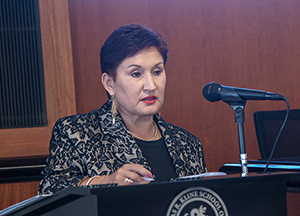 Former Guatemalan Supreme Court Justice and Attorney General Thelma Aldana, in a second keynote, described the transitional justice process that unfolded after the nation’s 36-year civil war.
Former Guatemalan Supreme Court Justice and Attorney General Thelma Aldana, in a second keynote, described the transitional justice process that unfolded after the nation’s 36-year civil war.
When violence and disappearances continued after the peace accord was signed in the 1990s, Aldana said through a translator, a human rights prosecutor opened multiple offices to handle cases involving activists, journalists and ordinary civilians.
Prosecutors engaged forensic anthropologists and other experts as they pursued thousands of cases, including one involving hundreds of civilians buried on the grounds of a military base.
When the justice system failed to attend sufficiently to some victims, Aldana said, a Court of Conscience was established that elicited testimony from survivors and an analysis of military plans and an operational manual that alluded to the taking of sexual slaves.
Military officers in one case, which has been upheld in higher courts, received sentences of 120 to 240 years, Aldana said.
“It was the first case in the world that drew a sentence for sexual slavery during war,” Aldana said. “Victims felt the full support of the system.”
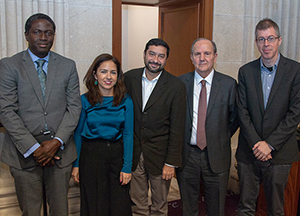
Transitional Justice in Context
A panel that explored the diverse contexts in which transitional justice occurs was moderated by Roger Duthie, senior research expert at the International Center for Transitional Justice (at far right, in photo).
- Professor Roland Adjovi, a member of the UN Working Group on Arbitrary Detention and faculty member at Arcadia University, contrasted the democratization processes that have unfolded in Bénin and Côte d’Ivoire, two former French colonies that became independent in the same time frame. Côte d’Ivoire’s transition to democracy entailed more bloodshed than the process in Bénin, Adjovi said. In Bénin, political opponents received amnesty, returning to the country and politics, and the new constitutional framework allows the judiciary to address human rights violations. In Côte d’Ivoire, there was more international involvement, including some international prosecutions, and yet, Bénin’s transition has been more successful.
- Noha Aboueldahab, a visiting fellow at Brookings Doha Center, said that transitional justice can be used “as a battlefield for competing views of justice.” The trial of former Egyptian president Hosni Mubarak for human rights violations in the killing of protesters during the 2011 anti-government uprising was highly symbolic, Aboueldahab said, creating a scapegoat “to appease public anger.” Yet the limited scope of criminal charges and an emphasis on corruption, she said, made the trial less of a reckoning with the past than “a reckoning with the transition itself.”
- Professor Nelson Camilo Sánchez León, former director of Transitional Justice at Dejusticia in Bogotá and current director of the International Human Rights Clinic at the University of Virginia School of Law, discussed the peace agreement that aimed to end Colombia’s 50-year-old civil war. The accord, which earned plaudits from President Obama and the U.N. and helped Colombian President Juan Manuel Santos win a Nobel Peace Prize, was rejected by Colombian voters. Lawyers supporting the measure focused singularly on institution building and failed to communicate with the citizenry, Sánchez said.
- Professor Juan Méndez, former UN Special Rapporteur on Torture and Other Cruel, Inhuman and Degrading Treatment, former president of the International Center for Transitional Justice and current faculty director of the Anti-Torture Initiative at American University Washington College of Law, said that some crimes are so egregious that they don’t lend themselves to reconciliation and that victims must be given a voice. Human rights law has changed as a result of transitional justice, Méndez said, and emerging norms must be applied in widely varying contexts.
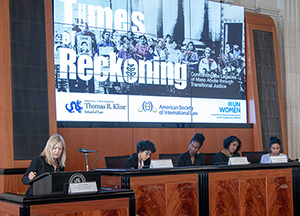
Memorialization of Transitional Justice
A panel moderated by Professor Ruti Teitel, the Ernst C. Stiefel Professor of Comparative Law at New York Law School and an internationally recognized scholar on international law and human rights, explored different ways transitioning societies memorialize past injustices and the distinctions in how these shape a society’s prospects for avoiding future atrocities.
- Julia Viebach, a departmental lecturer at the University of Oxford’s African Studies Center, discussed her research on memorials established to honor the Tutsis killed during the genocide in Rwanda. Memorials have become a powerful site of mourning and grief for survivors who continually tend and clean them, and created a sense of belonging for those whose homes and loved ones were lost. The sites permit survivors to focus on those who perished more than the perpetrators.
- Professor Ursula Doyle of the Salmon P. Chase College of Law at Northern Kentucky University presented her work on slave burial sites in the U.S., such as those discovered beneath the Huntsville Hospital in Alabama, a building on the University of Georgia campus and elsewhere. Citing the recognition that gravesites have received under international law, as well as prohibitions against racial discrimination, Doyle said it may be possible to seek repatriation of human remains under the 2007 UN Declaration on the Rights of Indigenous People, a complaint under the International Court of Justice Human Rights Committee or other forms of justice.
- Ereshnee Naidu-Silverman, the senior program director of the Global Initiative for Justice, Truth and Reconciliation at the International Coalition of Sites of Conscience, discussed the use of art, ritual and ceremony to preserve victims’ and survivors’ memories and “bring the reality of transitional justice to ordinary people” in diverse locations. Following the 2009 Guinea Stadium Massacre, a needs assessment of the community by Naidu-Silverman and colleagues determined that an overriding need for survivors was simply to know the truth: “who did what to whom?” Creating a platform for diverse voices and preventing future violence are equally critical roles of transitional justice, she said.
- Radhika Hettiarachchi, team leader with the Community Memorialization Project in Sri Lanka, discussed her work promoting intergenerational dialogue, building upon her previous work with Herstories, an initiative that created an archive of women’s narratives of the 30-year civil war that ended in 2009. Because the war “ended with resounding victory for government forces,” Hettiarachchi said, efforts by the vanquished to memorialize their own narratives were lost. Those seeking to encourage dialogue and memorialisation, she said, need to recognize the challenges of maintaining neutrality and the right of survivors to forget, if that is their preference.
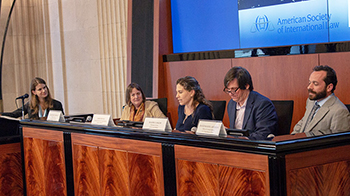
The Role of Foreign Courts
The final panel, moderated by Federica Tronchin, the head of the Justice Rapid Response USA Office and program manager for Sexual and Gender-Based Violence and the Middle East and North Africa Region, explored the changing role of international courts and universal jurisdiction over crimes in Chile, Guatemala, the former Yugoslavia and beyond.
- Professor Naomi Roht-Arriaza, distinguished professor of Law at the University of California-Hastings College of Law and the author of “The Pinochet Effect: Transnational Justice in the Age of Human Rights,” said the detention of the late Chilean dictator Augusto Pinochet by a British judge in the 1990s exemplifies the way that foreign courts have affected domestic investigations of those who violate human rights. Chilean courts were going to try Pinochet anyway, but the trials that unfolded in Belgium, Germany and France accelerated the process. Roht-Arriaza cautioned that universal jurisdiction “can be counterproductive” if it creates “an anti-colonialist narrative of foreign courts coming in and telling us what to do.”
- Professor Jamie Rowen of the University of Massachusetts-Amherst discussed cases in which the U.S. have used immigration courts to target individuals who may or may not have committed atrocities, under the guise of keeping terrorists and war criminals out of the country. The International Criminal Tribunal for the former Yugoslavia shared information with the U.S. Department of Homeland Security, paving the way to deport Bosnian Serbs who had been conscripted and may not have engaged in wrongdoing. The process, Rowen said, can “exacerbate existing pathologies.”
- Professor Maximo Langer, who directs the Transnational Program on Criminal Justice at the University of California-Los Angeles School of Law, discussed findings of his research on universal jurisdiction, observing that the number of trials completed in the last decade exceeds the number of trials that occurred in the prior 30 years. While states have long maintained a goal of preventing and punishing international crimes committed elsewhere, there is a rising incentive to refuse a safe haven for war criminals, Langer said, adding that the latter makes low-profile individuals more susceptible to prosecution, as does the growing institutional capacity of courts in many places.
- David Mandel-Anthony, a senior policy advisor on transitional justice at the U.S. State Department’s Office of Global Criminal Justice and an adjunct professor at Georgetown University, said inquiry commissions established by the United Nations are increasingly sharing information with national authorities. This has happened in Syria, Iraq and just three weeks ago in the context of the Rohingya crisis in Myanmar. The trend reflects the transnational nature of crimes committed, a shift in norms and a lack of viable international tribunals, Mandel-Anthony said, yet the process is hampered by legal and practical challenges: “It’s hard to collect evidence in a manner that’s probative if they don’t know features of system.”
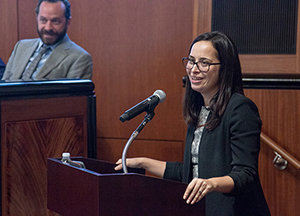 Kline School of Law Professor Rachel López, who organized the symposium with Drexel Law Review editors, said that work in the arena of transitional justice is as inevitable as it is necessary.
Kline School of Law Professor Rachel López, who organized the symposium with Drexel Law Review editors, said that work in the arena of transitional justice is as inevitable as it is necessary.
“The past re-emerges, despite our efforts to bury the past,” López said, observing that the Catalonia independence movement that roiled Spain came about “because of the failure to account for the past.”
López said the range of strategies for addressing atrocities is wide, but that those that allow society to preserve its values are paramount and have the potential to inform domestic policies.
Click here for full biographies of all speakers.